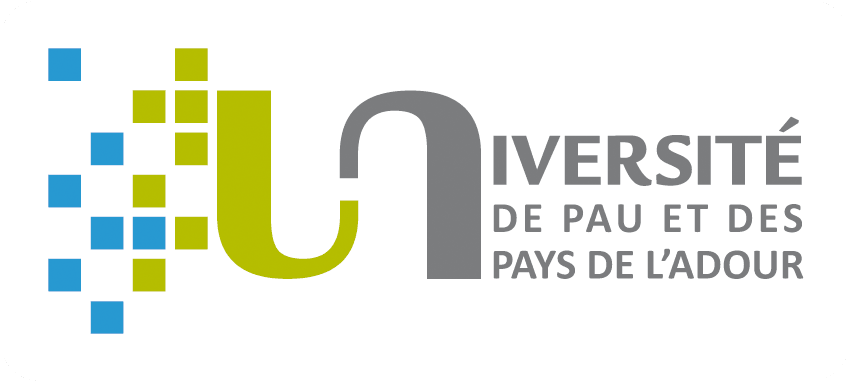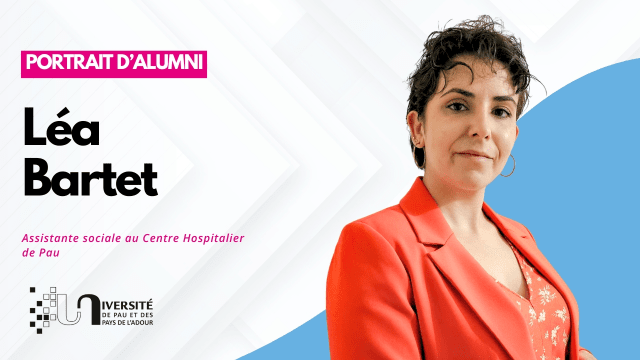In 2008, Léa Bartet decided to go back to school. She passed her baccalaureate as part of the UPPA Diplôme d'Accès aux Études Universitaires, then obtained a state diploma as a social service assistant and a degree in Economic and Social Administration (AES). Today, she works part-time as a social worker for two departments at the Centre Hospitalier de Pau: the Pôle Mère-Enfant and the Maison des Femmes-Santé.
You've had an unusual career. What are the milestones ?
In high school, I was directed towards a vocational baccalaureate in Accompaniment, Care and Personal Services, which didn't suit me. I asked to change my course of study to take a bac SPVL (Service de Proximité et de Vie Locale) and then study to become a social worker. The school refused this reorientation, so I opted for the vocational route. I passed my BAFA (Brevet d'Aptitude aux Fonctions d'Animateur) and my driver's license, then I worked in different structures - Ehpad, Protection de l'enfance... - which enabled me to validate my interest in social work. Then I did a civic service in animation. My mind was made up, I really wanted to be a social worker, but to do that I had to pass the baccalaureate. A guidance counselor told me about UPPA's one-year Diplôme d'Accès aux Études Universitaires. I seized this second chance, as most of the courses were in the evenings, which enabled me to continue working in animation. That's how I arrived at UPPA at the age of 21. I had to choose four subjects, so I took history-geography, Spanish, French and earth sciences (DAEU Option A-Literary). Little by little I regained my confidence and this year of DAEU was decisive for my future. I passed my baccalaureate and was able to take the state diploma in social work (ITS). In my final year - which was compulsory - I took parallel courses in the AES (Economic and Social Administration) degree at UPPA. Three years later, I graduated. Two months later, I was recruited on a permanent contract by the AJIR association (Action Jeunesse Innovation Insertion) as a social worker at the MECS du Domaine Saint-Georges in Montaut, which takes in young people in difficulty. I stayed for two years and learned a lot. At the DAEU, I remember a great deal of kindness, with teachers who were able to restore my self-confidence and value my work.
What memories do you have of the Pau campus ?
At the DAEU, I remember a great deal of kindness, with teachers who were able to restore my self-confidence and value my work. By the end of the year, with my A-levels in my pocket, I was mature enough to take the ITS (Institut du Travail Social) interviews, write my cover letter and put together a solid application. Unfortunately, the first year of the bachelor's degree was penalized by Covid, I wasn't able to do an internship and most of the classes were on video. Fortunately, we were a human-sized class - less than 50 students - which enabled the teachers to be very attentive.
Social work is a vast field. What audiences and fields were you most interested in ?
Clearly, child protection, medical, psycho-educational monitoring of children, support for families mourning the death of a child (which was the subject of my dissertation), women who are victims of violence... These are the issues I deal with today as a social worker in two departments at the Centre Hospitalier de Pau: Pôle Mère-Enfant and Maison des Femmes-Santé. My role is to help improve living conditions by supporting people while respecting their fundamental rights. I draw on a range of data (social, economic, etc.) to work with the individual to develop an action plan tailored to his or her situation. Networking and partnership work are also essential in our professional practice. It's all about supporting each person in a holistic way to find the best solutions. Sometimes, it's frustrating because we're always short of resources (limited places in homes, not enough specialized educators...) and we're faced with increasing administrative complexity that can slow down action. But I love this job, and I'm thinking of doing a Masters in Social Engineering to become a project manager. It involves developing partnerships and setting up projects with different structures.
Two or three words that you spontaneously associate with UPPA ?
The adaptability of the DAEU teachers to the level of the students - The human size of the classes - The simplicity of relations between students, teachers and UPPA administrative staff.
Any advice for students just starting out ?
I'd advise them to do a civic service in the social field. It gives them more maturity, validates their interest in the profession and enhances their initial experience. They also need to talk to social workers who can explain their job, their motivation, their frustrations... It's not an easy job, and you need to be well informed before taking the plunge.
Interview by Florence Elman
Want to know more?
On the UPPA Diplôme d'Accès aux Études Universitaires (Diploma of Access to University Studies)

Comments0
Please log in to see or add a comment
Suggested Articles



